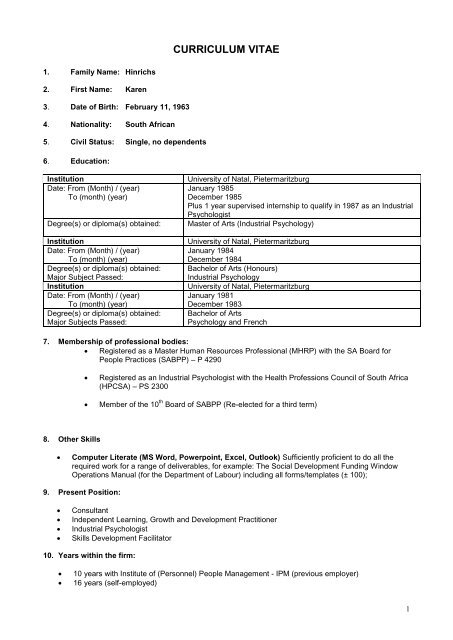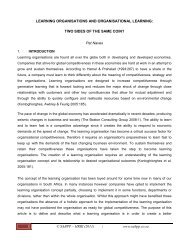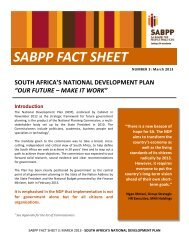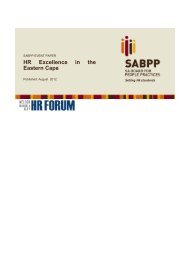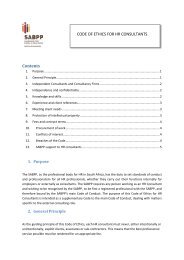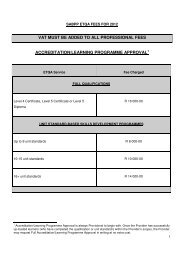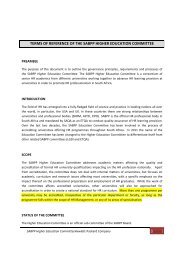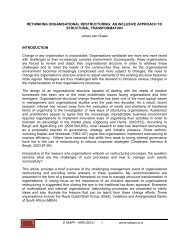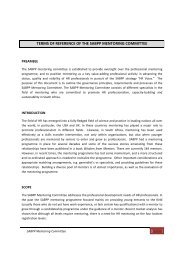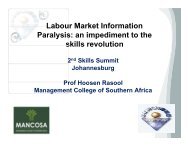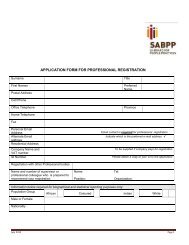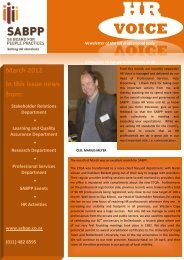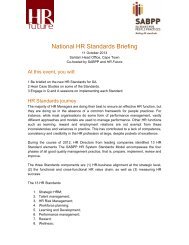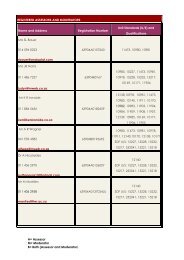CURRICULUM VITAE - SABPP
CURRICULUM VITAE - SABPP
CURRICULUM VITAE - SABPP
Create successful ePaper yourself
Turn your PDF publications into a flip-book with our unique Google optimized e-Paper software.
1. Family Name: Hinrichs<br />
2. First Name: Karen<br />
3. Date of Birth: February 11, 1963<br />
4. Nationality: South African<br />
5. Civil Status: Single, no dependents<br />
6. Education:<br />
<strong>CURRICULUM</strong> <strong>VITAE</strong><br />
Institution University of Natal, Pietermaritzburg<br />
Date: From (Month) / (year)<br />
To (month) (year)<br />
Degree(s) or diploma(s) obtained:<br />
January 1985<br />
December 1985<br />
Plus 1 year supervised internship to qualify in 1987 as an Industrial<br />
Psychologist<br />
Master of Arts (Industrial Psychology)<br />
Institution University of Natal, Pietermaritzburg<br />
Date: From (Month) / (year)<br />
January 1984<br />
To (month) (year)<br />
December 1984<br />
Degree(s) or diploma(s) obtained: Bachelor of Arts (Honours)<br />
Major Subject Passed:<br />
Industrial Psychology<br />
Institution University of Natal, Pietermaritzburg<br />
Date: From (Month) / (year)<br />
To (month) (year)<br />
January 1981<br />
December 1983<br />
Degree(s) or diploma(s) obtained: Bachelor of Arts<br />
Major Subjects Passed:<br />
Psychology and French<br />
7. Membership of professional bodies:<br />
� Registered as a Master Human Resources Professional (MHRP) with the SA Board for<br />
People Practices (<strong>SABPP</strong>) – P 4290<br />
8. Other Skills<br />
� Registered as an Industrial Psychologist with the Health Professions Council of South Africa<br />
(HPCSA) – PS 2300<br />
� Member of the 10 th Board of <strong>SABPP</strong> (Re-elected for a third term)<br />
� Computer Literate (MS Word, Powerpoint, Excel, Outlook) Sufficiently proficient to do all the<br />
required work for a range of deliverables, for example: The Social Development Funding Window<br />
Operations Manual (for the Department of Labour) including all forms/templates (± 100);<br />
9. Present Position:<br />
� Consultant<br />
� Independent Learning, Growth and Development Practitioner<br />
� Industrial Psychologist<br />
� Skills Development Facilitator<br />
10. Years within the firm:<br />
� 10 years with Institute of (Personnel) People Management - IPM (previous employer)<br />
� 16 years (self-employed)<br />
1
11. Key Competencies:<br />
Quality Council for Trades and Occupations (QCTO): for example – MERSETA Pilot Project -<br />
Member of Working Group 1 (Occupational Profile) and Working Group 2 (Learning Process Design) of<br />
the pilot project to develop the Occupational Curriculum Framework for the Occupational Trainer;<br />
Project Manager and participant in the work of the <strong>SABPP</strong> as the Assessment Quality Partner for the<br />
Occupational Trainer qualification; MQA Foundational Learning Curriculum (FLC) Facilitator Pilot<br />
Projects 1 and 2 – <strong>SABPP</strong> Project Manager (<strong>SABPP</strong> is the Assessment Quality Partner – AQP) from<br />
developing and designing the External Assessment (and Moderation) documentation (including costing<br />
and budgeting) and recruiting and training the External Assessors to managing the issuing of<br />
Statements of Results and closing out the AQP contribution of both of the pilot projects<br />
National Qualifications Framework (NQF)/South African Qualifications Authority (SAQA):<br />
demonstrated knowledge, understanding and practical application of the relevant legislation (and<br />
regulations), roles and responsibilities to implement the NQF; designing and developing qualifications<br />
and the whole process of generating unit standards; driving the process to get the qualifications/unit<br />
standards registered on the NQF as well as the process to get learnerships registered with the<br />
Department of Labour; functions of ETQAs including assisting (small, private) providers to become<br />
accredited providers; evaluating applications for accreditation and learning programme approval (from<br />
the ETQA’s side) and conducting (quality assurance) site visits; assuring the quality of learnerships from<br />
Quality Assurance Contracting to managing the upload of Learner Achievements to the <strong>SABPP</strong> MIS for<br />
onward transmission to the NLRD; Recognition of Prior Learning (RPL)<br />
General HR Framework in South Africa: registered as a Master HR Professional with the SA Board<br />
for People Practices (<strong>SABPP</strong>); elected to the 10 th Board of <strong>SABPP</strong> for a third term; developed an HR<br />
specialist qualification (Skills Development Management for Line Managers) that has been registered on<br />
the NQF – ID 66069; external examining of two Honours courses (Leadership and Change<br />
Management and Advanced HRM) as well as the Honours Research Reports and Masters<br />
Dissertations; external examining of an HR Strategy course; facilitation of strategic planning; writing job<br />
descriptions; performance management;<br />
Capacity-Building: compiling and implementing an HR Coaching Plan to build the capacity of an<br />
internal staff member of a client organisation to take responsibility for all aspects of skills development<br />
and employment equity; (part of a project team) building the capacity of Integrated Development<br />
Planning (IDP) Trainers, including a mentoring and coaching phase, where the IDP Trainers are cofacilitators;<br />
developing a municipal local economic development (LED) capacity-building plan for<br />
Gauteng municipalities and metros; designing, developing and implementing an organisational Quality<br />
Management System (policies and procedures including the required forms and templates);<br />
Project Management: have been self-employed for 16 years, so have implemented project<br />
management skills on an on-going basis especially in drawing up proposals to clients with or without<br />
Terms of Reference; have been the Project Leader/Manager on projects; project management and<br />
quality assurance in respect of the design and development of a unit standards-based assessment /<br />
portfolio including facilitating extension of accreditation scope with ISETT SETA; teach project<br />
management skills in the course I lecture annually at Wits Business School on Strategic Human<br />
Resource Development<br />
Human Resource Development: all aspects of training including needs analysis, design and<br />
development of learning programmes, assessment (of achievement of outcomes) and evaluation – both<br />
programme and impact; lecturing in Strategic Human Resource Development and Human Resource<br />
Development to post Graduate students; declared competent as an Assessor and a Moderator;<br />
Skills Development: practical application of the relevant legislation (Skills Development Amendment<br />
Act; Skills Development Levies Act) as well as related labour legislation; all aspects of the design,<br />
development, implementation and evaluation of learnerships; operating as an Independent Skills<br />
Development Facilitator implementing all aspects of skills development for individual organisations, for<br />
example Workplace Skills Plans, Annual Training Reports (Workplace Skills Plan Implementation Grants<br />
Skills Audits: conceptualising the skills audit as one component of a larger project; designing,<br />
developing and piloting a skills audit tool; managing and participating in the implementation of the skills<br />
audit on multiple sites; analysing and interpreting qualitative and quantitative data; documenting and<br />
presenting the findings and results and integrating the skills audit into a larger project.<br />
2
13. Professional Experience<br />
SUMMARY: 26 years – practical experience in both the operational and strategic aspects of Human Resources Development, general management, Human<br />
Resources Management, Project Management and Research and delivery of distance and contact education at the tertiary level; Equally able to work as a<br />
member of a team or as a team leader; Adept at ‘big-picture’ thinking as well as paying attention to detail<br />
April 1986 to March 1996 - based in Johannesburg, SA, IPM - Education Officer, Student Advisor, Diploma Manager, Manager: Professional<br />
Education and Development<br />
Description<br />
Karen began her career at the Institute of Personnel (now People) Management (IPM) in 1986 with the brief to research, design and implement a formal student<br />
support system (catering for � 2000 students in distance learning). In 1987 she was promoted to the newly created position of Student Advisor and then Diploma<br />
Manager in 1991. In mid-1993, the IPM Executive Board made a decision, on the basis of a future scenario that Karen had written, to merge the departments:<br />
Education and Training and she accepted the new managerial position that was created. Her major contributions were strategy development to determine a<br />
future model for IPM and the management, facilitation and support of the change process. Responsibilities included financial and human resource management<br />
(the department contributed 44% to the total turnover) with three middle managers forming part of the team of 15 full-time permanent staff and 40 external part-time<br />
tutorial staff.<br />
April 1996 to present – self-employed as a Learning and Development Practitioner and Industrial Psychologist<br />
Some recent projects: the location in every case is South Africa and the position in every case is consultant/subject matter expert and Project<br />
Manager/Quality Assurance Expert (QA) where specified.<br />
Organisation Description of Duties<br />
Practical application of all aspects of quality assurance in the National Qualifications Framework (NQF) context including but not limited<br />
to:<br />
<strong>SABPP</strong> (HR) ETQA<br />
(Project Manager/QA)<br />
Carl Zeiss Optronics<br />
(QA)<br />
� Design, develop and implement the ETQA Quality Management System policies and procedures including the required<br />
forms and templates;<br />
� Evaluate applications for accreditation or learning programme approval, including conducting site visits.;<br />
� Deal with all aspects of the quality assurance of learnerships including the Learnership Quality Assurance Contract and<br />
monitoring and verification responsibilities;<br />
� Manage relationships with HR Providers as well as with the IT Service Provider (to ensure successful uploading to the<br />
National Learners Records Database – NLRD)<br />
Gathering information through interviews with selected high performers per job (type) and compiling job descriptions; facilitating a<br />
consultative process to validate and verify the completed job descriptions<br />
3
Organisation Description of Duties<br />
South Deep Mine<br />
(Goldfields)<br />
Group Internal Audit<br />
(FNB)<br />
(Project Manager/QA)<br />
GTZ (now GIZ)<br />
(QA)<br />
Review and updating the Career Paths through a process of independent validation - the first step was to identify the existing Career<br />
Paths; the second step involved:<br />
� (Re) drawing the Career Paths taking into consideration the relevant Paterson Bands<br />
� Confirming that no Career Paths in use at South Deep were at odds/in conflict with those in use in Goldfields in general<br />
� Identifying anomalies<br />
� Validating the Career Paths in use at South Deep.<br />
One of the key findings was that the many versions of the Career Paths sat in different parts of the business – there was a real risk that<br />
as the ‘custodians’ of the Career Paths moved on (i.e. to other job opportunities within Goldfields or to other mining companies or even<br />
to retirement), institutional memory in respect of Career Paths may well be lost.<br />
Designing and developing Job Competency Models for each one of the 24 Role Profiles (Jobs) in Group Internal Audit including:<br />
� Qualifications<br />
� Experience<br />
� Skills<br />
� Competencies<br />
On the basis of Core, Desirable and Advantageous and for the Skills and<br />
Competencies whether they are people, task or behavioural<br />
The process followed was: conduct desk top review; draft Job Model Questionnaires; pilot Job Model Questionnaires; distribute revised<br />
Job Model Questionnaires; generate the Job Competency Models<br />
Basic Entrepreneurial Skills Development (BESD) Mentorship Programme – Mangaung Implementation (GTZ) including:<br />
� Revising the BESD Group Mentorship Model (based on a pilot project)<br />
� Re-working the Mentoring training material (Awakening Possibility) to ensure relevance to both the Mentors and Mentees (i.e.<br />
Emerging Entrepreneurs)<br />
� Improving the practical application of the mentorship flow.<br />
� Designing and developing a Facilitator’s Guide for each Awakening Possibility for Mentors and Mentees - this process included<br />
either finalising or developing (as applicable) a range of tools/documents to support the further implementation of the Group<br />
Mentorship Programme.<br />
� Conducting the training for both Mentors (X 7) and Mentees (X 53)<br />
� Taking up, in collaboration with the Working Group, any changes to the “Awakening Possibility” training material,<br />
tools/documents and the BESD Mentorship Programme Concept Paper which arose in the process.<br />
4
Organisation Description of Duties<br />
Department of Labour /<br />
GTZ (now GIZ)<br />
(QA)<br />
GIZ/Small Enterprise<br />
Development Agency<br />
(Seda)<br />
Centriq Insurance<br />
JHB Philharmonic<br />
Orchestra<br />
Merit Business Institute<br />
The Market Theatre<br />
SA Music Ed. Trust<br />
Bytes Solutions<br />
T and T Appointments<br />
(Project Manager/QA)<br />
Metso Academy<br />
(Barloworld)<br />
(QA)<br />
Reviewing, revising the existing and developing a new Social Development Funding Window Operations (SDFW) Manual for<br />
Department of Labour - DoL (supported by German Technical Cooperation - GTZ) including drafting of an operational manual for the<br />
DoL to guide the implementation of Basic Entrepreneurial Skills Development (BESD), to be one of the DoL’s sub-programmes<br />
� Facilitating Reference Group Workshops (with representatives from DoL in the provinces)<br />
� Designing and developing process flow diagrams for each component of the SDFW and BESD<br />
� For each component: Purpose/Intended Outcome; Activity Checklist; Supporting Documentation (Forms/Templates) and Key<br />
Business Rules<br />
� Review, revise and update the Basic Entrepreneurial Skills Development (BESD) Operations Manual and align it with the<br />
standard operating procedures of the implementing partner – Seda (Small Enterprise Development Agency) including<br />
facilitating Working Group meetings<br />
� Facilitate the BESD Courses and Learning Material Reference Group and Working Group meetings<br />
� Operating as an Independent Skills Development Facilitator implementing all aspects of skills development for individual<br />
organisations, for example Workplace Skills Plans and Annual Training Reports (Workplace Skills Plan Implementation Grants) in<br />
the relevant format prescribed by each SETA and linking to the OFO (specifically ETDPSETA so far).<br />
� Assisting (small, private) providers to become accredited providers – with Services SETA; ETDP SETA; MAPPP SETA, <strong>SABPP</strong><br />
ETQA; ISETT SETA<br />
Scoping the requirements to equip all re-deployed employees or new hires with the crushing and screening knowledge and skills to<br />
enhance and sustain the Metso business and take Metso to the next level – working towards Lowest Sustainable Cost Per Tonne as<br />
the benchmark<br />
� Reviewing current material<br />
� Consolidate the learning outcomes<br />
� Align the learning pathways<br />
� Consolidate and generate the scoping document<br />
5
Organisation Description of Duties<br />
Participating as a subject matter expert in the Quality Council for Trades and Occupations (QCTO) pilot project to develop the<br />
curriculum framework for Occupational Trainers (i.e. Technical Trainers/Instructors)<br />
<strong>SABPP</strong><br />
� Working Group 1 – developing the occupational profile (for the OFO)<br />
� Working Group 2 – learning process design including the knowledge component, practical skills component and the<br />
(Project Manager)<br />
workplace experience component.<br />
� Motivating for the <strong>SABPP</strong> to become the Assessment Quality Partner (AQP) for the Occupational Trainer qualification;<br />
coordinating and participating in the AQP work; planning to pilot the qualification in the MERSETA and Mining domains.<br />
Gauteng Dept. of<br />
Economic Development<br />
(Project Manager)<br />
DPLG / Local Govt.SETA<br />
(QA)<br />
GTZ (now GIZ)<br />
(QA)<br />
FirstRand Corporate<br />
Centre (FR CC)<br />
Trident Steel (Aveng<br />
Group)<br />
Local Economic Development (LED) Municipal Capacity Building Diagnostic, Planning, Monitoring and Evaluation -<br />
the overall objective of the project was to undertake a comprehensive assessment of operational and institutional capacity needs of<br />
municipal LED units in the province of Gauteng as the basis for the formulation of an LED Capacity Building Plan. Key components of<br />
the project were:<br />
� Skills audit (individual and institutional capacity) to identify capacity needs and constraints;<br />
� Analysis of municipal economic development capacity support available from Gauteng Provincial Government sector<br />
departments.<br />
� Identification of appropriate and accredited private institutions and organisations supplying capacity building services.<br />
� Investigation of available capacity building financing mechanisms.<br />
� Identification of the roles and responsibilities of key stakeholders in supplying municipal economic development capacity<br />
support.<br />
� Development of detailed guidelines for the implementation of a process to monitor and evaluate capacity building exercises.<br />
(As a member of a project team) developing a comprehensive set of training material and allied resources for Local Economic<br />
Development learnerships at NQF Levels 5 and 6, including Assessment Guides, Portfolios of Evidence, Learnership Logbooks and<br />
Workplace Coach Guidelines – my contribution was the HR modules for each level plus all the supporting documentation (Assessment<br />
Guides etc.) for every module in both levels.<br />
(Part of a project team) Building the capacity of Integrated Development Planning (IDP) Trainers, including a mentoring and coaching<br />
phase, where the IDP Trainers are co-facilitators – my contribution was planning, conducting and reporting on a comprehensive training<br />
needs analysis (of IDP Trainers), designing and developing the mentoring and coaching phase and finalising the Project Report.<br />
Following on from a comprehensive Skills Assessment/Analysis for Group Internal Audit (GIA) in 2011, the Head: Learning and Talent<br />
Management, Human Capital Division requested a Skills Assessment/Analysis in the remaining Business Units (± 12) that make up<br />
the FR CC, consisting of approximately 645 employees. Recently, a new Competency Library was introduced for the Corporate Centre<br />
and this must form the basis of the Skills Assessment/Analysis. However, it has still been necessary to ensure that every Role Profile is<br />
properly aligned to the Competency Library, before designing and developing the Skills Assessment Questionnaires<br />
Skills Audit/Talent Assessment: Approximately 1800 employees; Eight Phases – Identification of Jobs and Job Requirements;<br />
Preparation of Data Collection Tools; Accessing Employees; Pilot Study; Obtaining Relevant Information; Capturing Information into<br />
Database; Analysing the Database; Final Report and Presentation<br />
6
Organisation Description of Duties<br />
(Part of a project Team) Evaluation of the Public Service Induction Programme (PSIP) Aimed at supporting the creation of a<br />
competent public service by providing analysis and insight into the current induction process and the policies that guide it. Purpose of<br />
GIZ/PALAMA<br />
the research:<br />
� Study the policy relating to the induction process<br />
� Obtain the views and perceptions of public servants on the PALAMA Public Service Induction Programme (PSIP) and the<br />
broader induction process<br />
� Provide policy guidelines for the development of induction and reorientation processes<br />
14. Other relevant information:<br />
Recent Presentations<br />
� “Exploring the implications and benefits of professional registration for people practices, with a specific focus on professionalising Skills Development<br />
Facilitators”<br />
� Accelerated Artisan Programme Symposium - merSETA “The status of the South African Occupational Trainer Qualification - implications for improving<br />
institutional training in the manufacturing and engineering sector”.<br />
� “The <strong>SABPP</strong> ETQA’s role in addressing the challenges in the HR profession” and “Feedback on the QCTO pilot project to develop the curriculum framework<br />
for the Occupational Trainer”<br />
7


